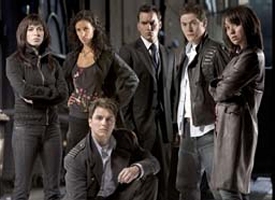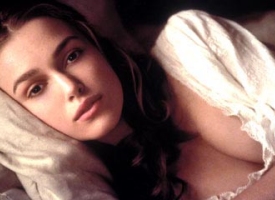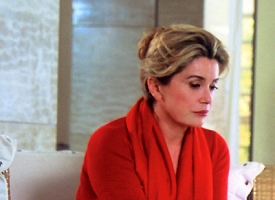
Keith of
Tommy Westphall's Mind asks:
What's the major problem with Torchwood and can Russell T Davies fix it or is it a lost cause? Can a showrunner really run two shows at once?The difficulty with defining the major problem with
Torchwood, is that the answer is bound to be highly subjective. To look some of the preview sections of newspapers or comments online (particularly the
Doctor Who fan discussion boards at Outpost Gallifrey) the show is going from strength to strength and the viewing figures confirm this with the BBC Three first run regularly polling as the top show on the channel. If Torchwood wasn't entertaining viewers they'd be drifting away. Obviously a percentage of that audience will be
Doctor Who fans still watching because it's a spin-off from their favourite show, they would not be enough to sustain what's clearly being seen as a success by the BBC, with Mark Thompson recently suggesting that it will run and run.
On a purely subjective level, then, the mistake was in creating an adult spin-off from a family show, largely making the show an exercise in justifying its timeslot. At its inception, the production team explained that it would allow them to tell stories that they couldn't in the Saturday night family slot. This has certainly been obvious in the episodes already broadcast which in no particular order have featured suicide, nymphomania, rape, murder, pedophilia, cannibalism, necromancy, swearing and metro-sexuality. The execution of these elements has been very gratuitous, which isn't necessarily to be criticized in and of itself. Except this has largely meant that the content of the stories seems to be governed by the need to include these elements rather than logical plotting, and indeed in an episode like
Small Worlds the scary but benign opening to the story is rejected for something darker with the death of an apparently important character being almost entirely arbitrary. Did Jack's old flame really need to die with all of the other mayhem that was happening around them?
There is a willful (and bizarre) ignoring (or ignorance) of the need for standard genre storytelling, of following classical narrative techniques. Film writer Thomas Sobchack indicates that 'in the genre film the plot is fixed, the characters defined and the ending satisfyingly predictable' and this is just as, if not more important in genre television, of which
Torchwood is an example, as the viewer gets their weekly fix of variations on the theme. In all cop shows its an investigation - who broke the law and why. In
The X-Files it's discovering the cause of some strange phenomena and in
Buffy as with all superhero shows it's the ongoing attempt to destroy evil.
Without A Trace is about the race to find the missing person. In
Star Trek it's more often than not the Enterprise or whatever ship has mission to carry out before the episode is up - in
Voyager that might be finding some metal to build a new shuttlecraft etc. In
Quantum Leap, Sam has to put right what once went wrong before he can leap. It's simply not possible to define
Torchwood in these terms, especially since it even ignores the opening speech that Jack gives before each episode.
In all of these shows the goal that is clearly defined the beginning of each episode is satisfyingly resolved by the end, the equilibrium maintained unless its purposefully left open as part of an ongoing story arc. In
Torchwood, the initial goal, which usually involves the investigation of an alien
something police procedural style is more often than not resolved in the opening first ten minutes of the episode and then a secondary goal is usually created because of the motivations or mistakes of someone within the crew. Although it's possible to suggest that this is the format it doesn't simply doesn't satisfy because predominantly the secondary goal is far less interesting than the proposed original. In
Ghost Machine the alien dongle's power is explained in the opening ten minutes as is the initial mystery of who is in Gwen's vision and the secondary goals of where is came from and Owen wanting to avenge the rapist are not strong enough to carry the rest of the episode
Cyberwoman and
Greeks Bearing Gifts are entirely based upon the premise that someone within
Torchwood hasn't been entirely honest and in all three the climax boils down to the results of one of the team deciding to admit that something dodgy has been going on.
This narrative uncertainty is carried over to the treatment of character. One of the key elements of any drama is narrative agency - in other words which character's point of view is being followed within the story and on a more particular level each scene. In genre television, narrative agency is held by one of the main characters, or a particular character if that's all that's in the room. In
The West Wing tonight, towards the end, there was a scene when Leo was finding out from the staff how bad a day its actually been. All of the close ups are with him as he looks out into the room at people who are essentially much smaller than him. So the audience is viewing the scene through his eyes and that continues as he goes into the Oval Office to have an argument with the President who again is usually shown well into the frame. It's a very subtle thing, and it has to do with acting, shot angles, editing and music and the director deciding who is most important in a scene and the message.
In
Torchwood, narrative agency is often all over the place and too often is 'conferred' on the guest star. In
Greeks Baring Gifts, which let's not forget is Tosh's first showcase, in nearly every scene she shares with Mary, it's the alien whose in charge - it's all about her reactions to Tosh and her manipulation of the situation. The problem is that it makes Tosh look weak and we never know what she is thinking - the episode is about Mary getting into Torchwood when it should be about Tosh trying to discover who this woman is. But Tosh hardly ever has agency anywhere in the episode - at the very end, it's all about Jack's leadership skills not Tosh trying to work out what do next. When she crunches the necklace it's about Jack (and so therefore us) willing her to make the correct decision.
Random Shoes was really only about the guest star with Torchwood becoming supporting characters in their own series.
On other occasions, there are scenes and episodes in which no one seems to have agency so the audience doesn't know what to think.
Countrycide has a morass of these scenes; look at the moment when Gwen is sewing up Owen's wound. Who is that scene about? It should be about Gwen saving Owen and the consequences of that, but the camera angles don't favour anyone and the performances don't reflect anything that has happened in the episode up until that point. This makes the characters a largely unsympathetic group and unapproachable curbing a lot of the entertainment. It's like watching
Big Brother's live feed before the editors have taken a day's footage and created a narrative.
Can these problems be resolved? Of course they can. The show just needs a much clearer vision, the Torchwood team needs to be far more goal-orientated and a more clearly defined episode structure. Each episode needs to state the mission or goal of the ensuing drama. This doesn't have to be something as strict as a diary entry from Captain Jack (for example) but it should have at least a scene in which all the characters pertinent to the story are together and the point is made.
Spooks does this all the time and it gives the ensuing story clarity - and whatever the goal is should be the point of the ensuing drama, the closing moments of the episode resolving whatever this is, with secondary goals being additions rather than substitutions. Possibly, the best episode of the series
Day One does exactly this.
Above all
Torchwood needs an injection of 'realism'. Often, the attitude to logical time is haphazard at best and sometimes its tricky to tell exactly the real world duration of an episode. It's not clear exactly how long Tosh and Mary spent together in
Greeks Bearing Gifts and the flub in
They Keep Killing Suzie when Owen says driving along in pitch darkness that they have minutes to save Gwen and moments later to be greeted with a climax in pure daylight is unforgivable. Although that's just careless, the probably solution to narrative problems might be to rain in the team and have a Jim Phelpsian figure sending them out on the missions underscoring the importance of what they're doing. It might even be an idea to make them more clearly answerable to the government - that would put a stop to all the pissing about in The Hub with basketball games - give them quotas and reports to consider.
The so-called run of the mill stories in most shows allow the premise benders to really shine. Arguably every episode of
Torchwood breaks a premise that hasn't been too clearly defined which makes the series incredibly difficult to watch. Some might call this a brave experiment, but how can the audience hope for a return to a status quo if it isn't entirely clear what that status quo actually is? All of the show's other problems, such as characterization are a knock on effect from this and would be largely resolved if classical storytelling techniques were being followed. If the characters are allowed to actually save the day without being the cause of the crisis in the first place, our empathy with them will improve too.
The answer to the second question is -- yes. Definitely. In future years we'll discover how much day to day time Russell T Davies spent on
Torchwood along with
Doctor Who and
The Sarah Jane Adventures. Is he, as I suspect, only actually the showrunner on one of them? Its worth keeping in mind that Joss Whedon managed
Buffy season seven,
Angel season four and
Firefly altogether in the same year and arguably the first two were a renaissance for their respective shows and the last is still a television classic. But he cleverly had the right creative teams put together whom he trusted with some of the nuts and bolts but he was also, somehow, able to keep his own creative vision for all three. Listen to the audio commentaries and its apparent that the majority of his energy was with
Firefly, but he still managed to pen the final episode of
Buffy. Frankly the man is a creative machine and anyone in those circumstances who can turn out a great piece of television - period - like the
Firefly episode
Objects in Space deserves respect.









